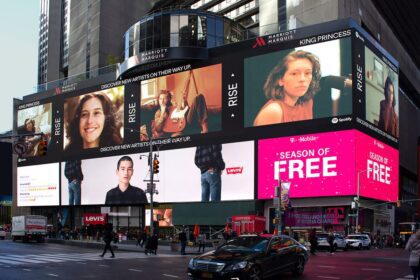The New Era of Social Media
Social media isn’t just about sharing anymore it’s about connecting, buying, and belonging. Platforms have shifted from digital billboards into immersive ecosystems where culture, commerce, and community collide. In 2025, the trends shaping social media are moving faster than ever, driven by technology, consumer behavior, and cultural shifts.
According to Statista, global social media users are expected to surpass 5 billion this year, making it the most powerful marketplace in history. For entrepreneurs, brands, and creators, staying ahead of these trends isn’t optional it’s essential.

AI-Generated Content Takes Center Stage
AI is no longer just a backend tool it’s becoming the creative partner. From personalized video captions to AI-generated art, businesses are leveraging artificial intelligence to scale content without sacrificing quality.
A HubSpot survey in 2024 revealed that 58% of marketers already use AI for content creation, with that number expected to grow significantly this year.
Key impact: Faster production, hyper-personalized engagement, and democratized creativity.

Short-Form Video Still Rules
Attention spans are shrinking, and short-form video remains king. TikTok, Instagram Reels, and YouTube Shorts continue to dominate, with algorithm-driven discoverability giving small creators a global stage.
Brands are increasingly prioritizing “edutainment” educational content delivered in quick, entertaining bursts.
Key impact: Businesses must master storytelling in under 60 seconds to stay relevant.

Rise of Micro-Communities
Big audiences are losing their charm. Today’s users crave intimacy and authenticity, leading to the rise of micro-communities on platforms like Discord, Telegram, and private Facebook groups.
GWI reports that 76% of Gen Z prefers communities that feel “niche and personal” over broad, general networks.
Key impact: Brands that foster tight-knit groups enjoy higher trust, loyalty, and organic growth.

Social Commerce Goes Mainstream
Shopping is now seamlessly integrated into social media. TikTok Shop, Instagram Checkout, and Pinterest’s shopping features have transformed scrolling into instant transactions.
Insider Intelligence estimates that U.S. social commerce sales will hit $80 billion by 2025.
Key impact: Businesses that don’t sell directly through social platforms risk losing massive revenue opportunities.

Authenticity Over Perfection
Polished perfection is out; raw authenticity is in. Consumers, especially younger generations, prefer brands and creators who are transparent and relatable. This shift has fueled the popularity of platforms like BeReal and the rise of “behind-the-scenes” content.
A Deloitte study found that 82% of Gen Z trusts brands more when they show real people and authentic stories instead of polished ads.
Key impact: Storytelling and vulnerability outperform traditional marketing polish.
Conclusion: Adapting to the Social Media Future
The social media landscape in 2025 is defined by speed, authenticity, and innovation. AI is rewriting creativity, short-form video continues to dominate attention, micro-communities drive deeper loyalty, social commerce turns platforms into marketplaces, and authenticity is now the strongest currency.
For brands, entrepreneurs, and creators, the winners will be those who adapt quickly experimenting with new formats while staying true to their voice. Social media success is no longer about who shouts the loudest, but who connects the deepest.

FAQs
1. Which social media trend is the most important in 2025?
AI-driven content and short-form video remain the most influential for growth.
2. Is TikTok still growing?
Yes. Despite regulatory debates, TikTok continues to expand globally and drives social commerce.
3. How can small businesses compete with big brands on social media?
By focusing on authenticity, niche communities, and storytelling over big-budget ads.
4. What role does AI play in social media marketing?
AI helps with content creation, personalization, and data-driven insights to boost engagement.
5. Will long-form content disappear?
Not entirely blogs, podcasts, and YouTube long-form still matter, but short-form dominates discovery.






